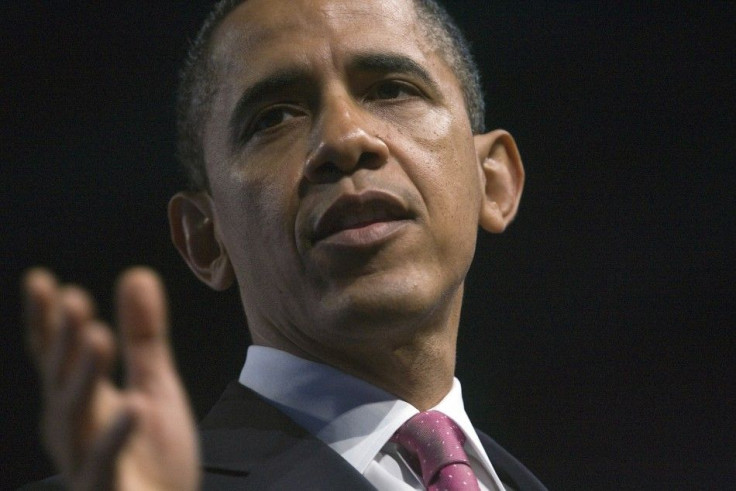Obama’s AIPAC Speech: International Response
Analysis

At the American Israel Public Affairs Committee (AIPAC) Policy Conference 2012, President Obama had strong words for Iran. I do not have a policy of containment; I have a policy to prevent Iran from obtaining a nuclear weapon, he said. And as I've made clear time and again during the course of my presidency, I will not hesitate to use force when it is necessary to defend the United States and its interests.
But he also cautioned against Israel's loose talk of war, arguing that over the last few weeks such talk has only benefited the Iranian government by driving up the price of oil, which they depend on to fund their nuclear program. For the sake of Israel's security, America's security and the peace and security of the world, now is not the time for bluster.
The president was optimistic about the impact of continued economic sanctions against Iran. Now is the time to let our increased pressure sink in, he said.
While both Obama and Israeli Prime Minister Benjamin Netanyahu believe that Iran intends to develop nuclear weapons, they don't agree on the best response. Netanyahu has threatened unilateral military action, which Obama discourages.
Interpretations of the president's speech have differed among Israelis, but many have reacted positively. Haaretz, a widely-read liberal daily newspaper, notes that Obama didn't say anything on Sunday that he hasn't said before. He believes that months still remain in which to exhaust the policy of pressuring the regime in Tehran... In other words, right now it would be premature and rash to make good on his promise to use military force against Iran as a last resort, wrote columnist Amir Oren.
On the other side of the political spectrum, Israeli conservative Ben-Dror Yemini happily asserted that Obama couldn't be clearer about his commitment to a military strike. He sounded almost like the Likud leader, he added. Likud is the hawkish political party of Netanyahu.
Centrist Shelly Yachimovich, head of the Israeli Labor Party, also voiced approval according to the Jerusalem Post, noting that Obama's speech was strongly pro-Israel.
It would seem that Obama has conducted himself masterfully, meeting a diverse set of expectations. Still, there were some who criticized Obama for treading too carefully. Amos Yadlin, former head of the Israeli Defense Forces Military Intelligence Directorate, decried misleading messages according to the Times of Israel. You can't say all the options are on the table, and broadcast the opposite message that we are concerned about a military option, he argued.
In the United States, the loudest responses to Obama's speech are coming from his political opponents. Candidates in the Republican presidential primary have been eager to paint themselves in stark contrast to the president. Of the four, all but Ron Paul have criticized him for being too soft on Iran.
Rick Santorum, who has voiced his intention to attack Iran's nuclear facilities if uranium enrichment continues, said on Monday that we have a president who doesn't recognize the historical roots of the state of Israel.
During a CNN appearance on Sunday, Newt Gingrich weighed in. We've had no evidence that the president is prepared to take steps to stop Iran from getting a nuclear weapon, he said. They talk and the Iranians build... and we're being played for fools.
Romney also had stones to throw on Sunday. If Barack Obama gets reelected, Iran will have a nuclear weapon, and the world will change, he said during a campaign stop in Georgia.
All three candidates will address the AIPAC conference via satellite on Tuesday.
Recent surveys indicate that both the American and Israeli citizenries are on Obama's side. A Pew Research Center poll found on Monday that in the case of an Israeli attack against Iran, 51 percent of Americans would want the U.S. to stay out of it.
And a University of Maryland poll found even starker results in Israel: only 19 percent of the public there would support a strike against Iran without U.S. backing.
For now, talks are ongoing. Both the prime minister and I prefer to solve this diplomatically, said Obama as he and Netanyahu sat down to commence private consultations on Monday.
Israel and America will stand together, added Netanyahu.
As the allies discuss their options, Iran continues to enrich uranium while insisting that the objectives of its nuclear program are peaceful. On Monday, the International Atomic Energy Agency (IAEA) reported that Iran has tripled its monthly production of higher-grade enriched uranium. IAEA Director General Yukiya Amano said in a speech that the agency continues to have serious concerns regarding possible military dimensions to Iran's nuclear program.
© Copyright IBTimes 2024. All rights reserved.






















